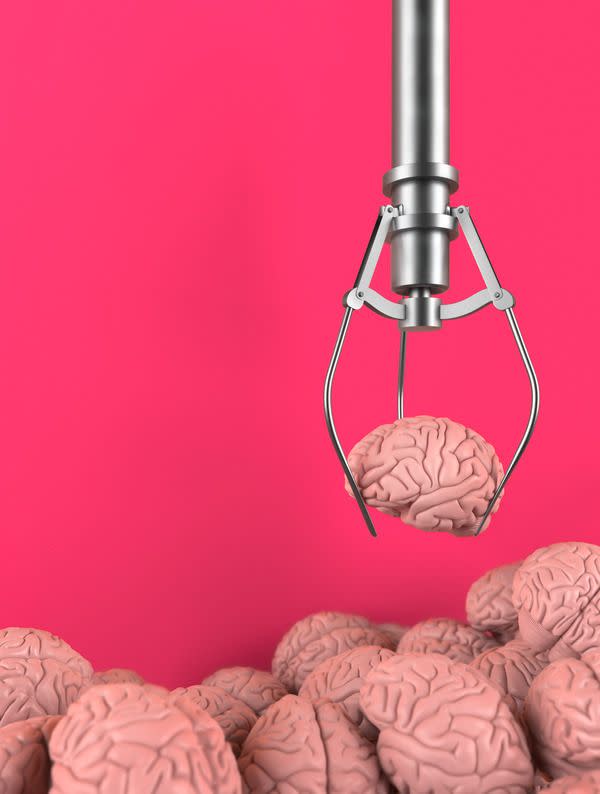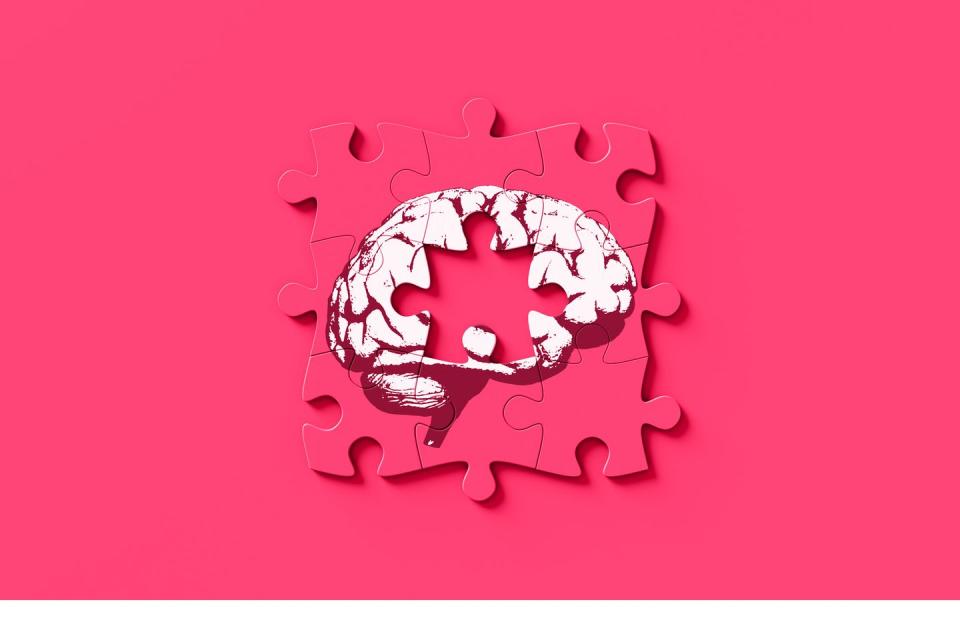Forgetful Much? How to Improve Your Memory Right Now

"Hearst Magazines and Yahoo may earn commission or revenue on some items through these links."
Oh, how familiar it is: You put your phone down, and a few minutes later you’re looking for it everywhere…in the kitchen, in your purse, on the floor—Did I leave it in the car? Or you run into a neighbor and while you chat about their dog’s cuteness, you’re frantically searching your brain for their name. Or you head to the store to pick up just five simple items and wander the aisles trying to remember three of them.
When this happens, you might wonder whether it’s the start of a brain decline that’s going to cascade into dementia or Alzheimer’s disease. The reassuring news is that there are many reasons—everyday, non-scary reasons—why we forget things. And there are tips and tricks, as well as solid lifestyle changes, that can help you bolster your brainpower and strengthen your memory overall.
First, how memory actually works
Here’s a clear explanation from Lisa Genova, a neuroscientist and the best-selling author who wrote Remember: The Science of Memory and the Art of Forgetting. “Our senses are exposed to a lot of information, emotions, and language over the course of a day,” she says. “But the brain is not a video camera, recording everything. To make a memory, your brain takes in what you perceive and pay attention to, and it translates that into neurological language. Your brain weaves all that into a single pattern of associated connections, which is then stabilized as a neural circuit.
“Then, tomorrow or 30 years from now, you want to be able to retrieve it,” Genova continues. “We’ve got this neural circuit that’s connecting different parts of the brain—like, I saw, heard, and felt this about something. So now those three are connected and become a single thing that can be perceived as a memory—and if we want to be able to recall it, we need to be able to reactivate that neural circuit. And that is the experience of remembering.” So what gets in the way of the process? There are a host of reasons we may have trouble reactivating that neural circuit. Some of them have to do with our fast-paced days, moving from one task to another while we’re also keeping an eye on our phones and our kids and our jobs and thinking about our shopping list and whether we need to check in on our parents. And we think we’re much better at multitasking than we actually are (more on that to come!).
There are also larger lifestyle factors that can dull our brains, such as skimping on sleep and not moving our bodies enough. The flip side, though, is that there are actionable steps you can take—and by doing them proactively, you can reduce some of the anxiety that follows those I lost my keys again?! moments.

How to remember anything better
Want to be better at remembering? Try some of these suggestions:
Use the cues around you
Here’s a scenario you may well recognize: You’re getting ready to, say, climb into bed to read before shutting off the light, and you realize that your reading glasses are down in the kitchen. But when you’ve headed downstairs and gotten to the kitchen, you look around and wonder, Why am I here? What did I come downstairs to get?
It’s easier to retrieve a memory when the context of where you are matches the context of what was there when the memory was formed, says Genova. “In your bedroom, the contextual cues are your book on the nightstand, the time of day, your bed—but then when you get to the kitchen, the surrounding cues are the fridge and the teakettle on the stove. And you might think, Did I come downstairs because I was hungry or wanted tea? The cues in the kitchen actually misdirect the hunt, sending your neural activity down pathways that lead to a meal or tea.” When this happens, says Genova, “Go back to the previous room—even in your mind’s eye. Look around at the cues that are there, and they’ll probably deliver the memory of what you intended to get.”
Working memory is like information written on a Post-it note in disappearing ink, says Genova. “It only lasts a short while. New information in the brain only goes past working memory if something is meaningful, emotional, surprising, or new.” And that’s OK, she adds—you don’t need to remember every cup of coffee, every conversation. “But if your daughter texts you to say she’s just gotten engaged? You’ll remember that, because it’s meaningful, emotional, and surprising. That’s what kicks it from a working memory that evaporates in a few seconds into something that may stick around.”
Pay attention
“Attention is the golden ticket of memory,” says Genova. “It’s the first essential ingredient in remembering anything past this present moment. We often don’t use this, and then we think we’ve forgotten something. But it’s not that we’ve forgotten—we never created the memory in the first place if we didn’t pay attention.”
Let’s say you put your glasses down on the counter and then go off to do a bunch of other things. “A couple of minutes later, you’re like, Oh my God, I can’t remember where I put my glasses. What is wrong with my memory? Well, you never created a memory, because to do that, you need the neural input of attention,” says Genova. “Give it a moment’s attention—even say it out loud, because then you’re giving your auditory cortex a chance to have more input. Then you’re actually creating a memory.”
Write it down
Do you remember things much better when you’ve jotted them down? There’s a reason that’s a powerful tool, says Genova. “Think of a memory as nodes of attachment in the brain,” she says. “So if I just say some words, they have some meaning for me, but if I write them down, now I’m using another part of my brain. It involves more senses. If you think of the brain as a neural network, the more points of attachment there are to a memory, the more possibilities you have for accessing it later. Plus, by writing it down, you’re revisiting the memory, essentially practicing it, and when you do this, you are reactivating the neural pathways of that memory, making it stronger.”
Another important reason writing things down is a good practice: “Our brains are not designed to remember to do things later,” says Genova. “This is called prospective memory, and it is unreliable in everyone. People think, Oh, it’s cheating if I use a to-do list or a checklist. I should be working that part of my brain, or it’s going to get weaker. But it’s actually very good practice to outsource the job to a written list. Prospective memory requires the exact right cue in the exact right place at the exact right time. Don’t expect that your brain will remember anything you need to do later. It isn’t cheating to write things down.”

How to improve your overall memory
You can help keep your brain humming along and better able to retrieve memories by focusing on these five tips—all of which have multiple other benefits for your overall health.
Amp up your exercise
There have been several studies on the benefits of exercise for memory, and long-term research published in 2022 underscored this: It found that moderate and vigorous physical activity was associated with higher cognitive scores, including on memory tests. Besides the physiological benefits of exercise to the brain, the researchers pointed out that getting structured exercise involves self-motivation, social interaction, and planning, all of which are said to be stimulating for cognition.
You don’t need to run marathons to get benefits: brisk walking, HIIT workouts, dancing, and swimming all count. “Exercise is a total-brain activity,” says neurologist Douglas Scharre, M.D., of the Center for Cognitive and Memory Disorders at Ohio State’s Wexner Medical Center. “As you exercise, you’re building up brain connections and brain reserve and forming more neuron- to-neuron connections. The more complex the exercise, the more connections are likely made. However, any exercise is beneficial.”
Prioritize sleep
Not getting enough shut-eye night after night? That can definitely dull your memory, research shows. Here’s why: “There’s evidence that sleep is a time when the brain is actively removing and clearing proteins and toxins,” Dr. Scharre says. “It’s important to get deep stages of sleep for the most benefit. When you’re sleep-deprived, we know that can lead to impaired thinking. And if you don’t get enough deep sleep, you may not be clearing the toxins from the brain as well.” When you focus on getting better sleep at night, you’ll very likely find that you feel sharper and more alert during the day.
Take time to de-stress
When you’re stressed and anxious, cortisol (a stress hormone) runs high, which has an impact on the hippocampus as well as other sections of the brain that are involved in memory, research has found. So if you can’t remember where you stashed your phone and are frantically flipping over the couch cushions, take a break, sit down on that couch, and breathe deeply for a minute or two. When your brain calms down, you’ll be much better able to focus.
Zoom in on eating well
“Food definitely has an impact on memory,” says Dr. Scharre. “The brain needs oxygen, proper nutrients, and vitamins to function optimally. If you have deficiencies in any of these, the brain and the neurons will not work well. The Mediterranean diet—with vegetable oils, less red meat, more fruits and vegetables, and fewer processed sugars—seems to be good for brain function. And this diet leads to fewer problems from excess cholesterol and glucose.”
Try not to multitask
Yes, during a crazy- busy day, it’s hard to pay attention to just one thing at a time. But to return to something Genova said, attention is the golden ticket for memory. When you’re multitasking, your attention is split between two (or three or four) things, and that’s not ideal for focus. If you are talking on the phone while making coffee while putting away the groceries and then you can’t remember where you shelved the crackers you just bought, it’s no surprise: Your brain didn’t form that memory. But when you concentrate on what you’re doing, you’re making it easier for your noggin to do its job.
When to see a doctor about your memory: If you’re feeling more forgetful than not during the day and nothing seems to help, if your memory loss is associated with increasing confusion or behavior changes, or if your family is concerned that your forgetfulness seems to be increasing, it’s important to speak with your doctor right away. Cognitive and neurological tests can determine whether there’s a more serious medical situation.
You Might Also Like

